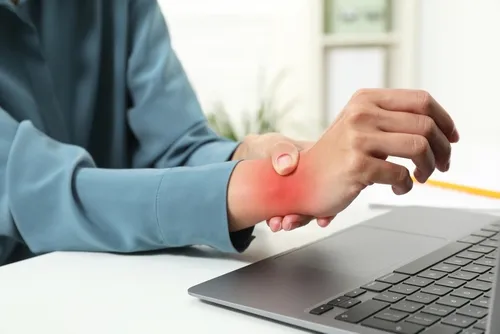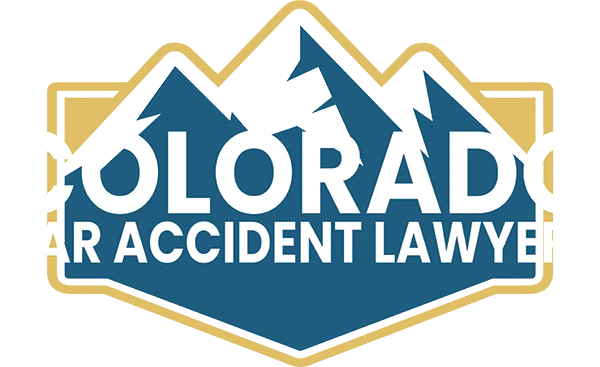Repetitive Stress Injuries and Workers’ Comp in Denver, Colorado
Colorado workers’ compensation covers repetitive stress injuries caused by your job. But the process can feel overwhelming. Insurance adjusters hunt for reasons to deny your claim. Our Denver workers’ compensation lawyers know how to prove your repetitive stress injury is work-related and will fight for every dollar you deserve.
You don’t have to shoulder medical bills or lost wages alone. A workers’ compensation claim can cover treatment costs and pay for time off work. Contact our Denver workers’ comp lawyers today for a free consultation.
Repetitive Stress Injury Symptoms
Repetitive stress injuries (RSIs), also called repetitive motion injuries or repetitive strain injuries, are a common and often overlooked category of workplace injuries. These injuries occur gradually over time, typically due to repeated motions, sustained awkward postures, or long periods of static positioning.
Unlike traumatic injuries caused by sudden accidents, RSIs develop subtly, making them harder to detect and diagnose early. Repetitive stress injuries can affect muscles, tendons, ligaments, and nerves, leading to pain, weakness, numbness, or reduced mobility.
Common Repetitive Strain Injuries at Work
Repetitive strain injuries can take many forms, depending on the job duties and motions involved. Common types of RSIs include carpal tunnel syndrome, tendonitis, bursitis, and epicondylitis (tennis elbow).
Carpal Tunnel Syndrome
Caused by compression of the median nerve in the wrist, carpal tunnel syndrome is common among office workers, cashiers, and assembly line workers. Symptoms include numbness, tingling, weakness, or pain in the hand and fingers. If left untreated, it can lead to permanent nerve damage and loss of function
Tendonitis
Tendonitis is the inflammation or irritation of a tendon, which is the tissue connecting muscle to bone. It often develops from overuse or repetitive movements and can affect areas like the shoulder, elbow, wrist, or knee. Workers who regularly lift, push, or reach, such as construction workers, warehouse employees, and healthcare professionals, are especially at risk. Tendonitis can cause pain, swelling, and reduced mobility, sometimes requiring physical therapy or even surgery.
Bursitis
Bursitis is the inflammation of a bursa—a small, fluid-filled sac that cushions bones and tendons near joints. Repetitive movements or pressure on joints can cause bursitis in areas like the shoulders, elbows, hips, or knees. Workers who kneel, lift, or lean on hard surfaces for extended periods are commonly affected. Symptoms often include pain, stiffness, and swelling, which can interfere with everyday tasks.
Other Repetitive Stress Injuries
- Epicondylitis (tennis elbow or golfer’s elbow) is caused by repetitive gripping or twisting motions.
- Rotator Cuff Injuries are common among those who frequently lift or reach overhead.
- Trigger Finger is when a finger becomes locked in a bent position due to repetitive gripping.
Workers in Denver and across Colorado face increased risks of RSIs depending on their roles. For example, warehouse workers may develop shoulder or back strain from frequent lifting, while dental hygienists often report neck and wrist pain due to sustained awkward postures.
At-Risk Jobs for Repetitive Motion Injuries in Denver, CO
Although often associated with office work, repetitive stress injuries can occur in virtually any industry, from construction and manufacturing to healthcare and food service. Some occupations have a higher risk of RSIs.
- Office and administrative workers: Prolonged computer use and typing can contribute to carpal tunnel syndrome.
- Warehouse and delivery workers: Frequent lifting, pushing, and reaching may lead to bursitis and tendonitis.
- Construction workers: Repetitive tool use, overhead lifting, and bending are common in the construction industry.
- Healthcare professionals: Nurses, dental assistants, and physical therapists perform repeated physical tasks.
- Food service and hospitality staff: Chefs, servers, and cleaners engage in repetitive manual labor.
- Drivers: Delivery drivers, truckers, and public transportation operators sit for long periods.
Regardless of your job, if you are experiencing pain or limited motion due to repeated tasks at work, it’s important to seek medical care and talk to a knowledgeable Denver RSI lawyer.
Does Colorado Workers’ Compensation Cover RSI Claims?
In Colorado, repetitive stress injuries are recognized under the workers’ compensation system. State law allows injured workers to seek benefits for job-related injuries.
Employment Status
To qualify for workers’ compensation, you must be classified as an employee under Colorado law. That includes most workers. Independent contractors may fall outside the system.
In Colorado, most employees are covered by workers’ compensation insurance. This includes full-time and part-time workers. Independent contractors and domestic workers, such as nannies, may fall outside the system.
If you are uncertain whether you qualify for workers’ comp benefits, talk with a Denver workers’ compensation lawyer.
Work-Related Injury
To win benefits, your repetitive stress injury must be work-related. You must show that your job tasks caused or worsened your repetitive strain injury over time.
Because RSIs tend to develop gradually and may not be immediately linked to a specific job task or incident, insurance companies often dispute or deny these claims. They may argue that the condition is due to age, non-work activities, or pre-existing health problems.
An experienced Denver workers’ compensation lawyer can help gather evidence to support your RSI claim.
Workers’ Comp for Repetitive Stress Injuries in Colorado
Repetitive stress injuries (RSIs) can make it difficult or even impossible to do your job. These injuries often develop over time from repeated movements like typing, lifting, bending, or using tools. If your repetitive strain injury is related to your work, you may be eligible for workers’ compensation benefits in Colorado.
These benefits are meant to help with medical costs and lost wages while you recover.
Coverage for Medical Care
Workers’ compensation in Colorado covers all reasonable and necessary medical treatment for repetitive stress injuries. This includes doctor visits, diagnostic testing (like MRIs or EMGs), physical therapy, medications, and surgery if needed. You’ll usually need to see a doctor chosen by your employer’s insurance company.
Temporary Total Disability Benefits
If your repetitive motion injury prevents you from working at all while you recover, you may qualify for Temporary Total Disability benefits. TTD benefits are typically two-thirds of your average weekly wage, up to a limit set by Colorado law.
Payments begin after you’ve missed three consecutive days of work due to your injury, and they continue as long as you’re unable to return to your job or until you reach maximum medical improvement (MMI).
Temporary Partial Disability Benefits
If your doctor clears you to work with restrictions, such as shorter hours or lighter duties, you may receive Temporary Partial Disability (TPD) benefits. These benefits generally pay two-thirds of the difference between your regular wages and what you’re now earning with limited work.
Permanent Partial Disability Benefits
In some cases, a repetitive strain injury causes lasting damage that doesn’t fully heal, even after treatment. If you reach maximum medical improvement but still have permanent limitations, you might qualify for Permanent Partial Disability benefits.
These payments are based on the type and severity of your lasting impairment. The amount is determined using medical evaluations and guidelines set by Colorado law. PPD benefits may come as a lump sum or in scheduled weekly payments.
Vocational Rehabilitation
If your RSI makes it impossible to return to your previous job, you may be eligible for vocational rehabilitation. This includes services like job training, education, resume support, or help finding new employment that fits your abilities.
Why You Need a Denver Workers’ Compensation Lawyer
Filing a workers’ compensation claim for a repetitive stress injury can be daunting, especially when you’re already dealing with pain, medical appointments, and lost wages. A knowledgeable Denver workers’ compensation lawyer can guide you through the entire process.
Insurance companies may try to minimize or deny claims. We’re here to advocate for you and fight for the benefits you deserve.
Filing Your RSI Claim
Your workers’ comp attorney will help ensure your repetitive stress injury claim is filed correctly and on time. A lawyer will help prepare clear documentation showing how your job duties caused your repetitive motion injury. Work injury attorneys will communicate directly with the insurance company, helping you avoid common mistakes that lead to delays or denials.
Maximizing Your Benefits
Insurance companies may calculate your wages too low or overlook the long-term effects of your injury. A Denver workers’ compensation lawyer will work to maximize your benefits or settlement. This might involve reviewing how your average weekly wage was determined or requesting a more accurate impairment rating.
Appealing a Denied Claim
If your claim is denied, a workers’ comp lawyer can guide you through the appeal process and fight for the benefits you deserve. They’ll start by reviewing the denial letter to understand why the claim was rejected. From there, your lawyer can gather additional records, speak with your doctors, and build a stronger case to support your claim. They’ll file the necessary forms to request a hearing and represent you in front of a judge.
Appealing a denied claim can be stressful and confusing, but having a knowledgeable workers’ comp lawyer on your side can make the process more manageable.
Steps to Take After a Repetitive Stress Injury at Work
If you believe you are suffering from a repetitive stress injury related to your job, it’s essential to act quickly and methodically. Unlike sudden injuries, RSIs can be easy to overlook or delay, something insurance companies often use against you.
Report Your Injury
In Colorado, you must report a work-related injury to your employer in writing within 10 days. If the injury developed over weeks or months, you should notify your employer as soon as you become aware that your symptoms are work-related.
Request a Designated Medical Provider
Your employer or their workers’ comp insurer will likely provide a list of authorized doctors. Choose one and schedule an appointment right away. If you seek care outside of this list, your medical expenses might not be covered.
Document Everything
Keep a detailed record of your symptoms, when they started, and how they relate to your job duties. Save emails, work logs, or job descriptions that support your claim.
File Your Workers’ Comp Claim With Legal Help
In addition to informing your employer, you may need to complete a Workers’ Claim for Compensation (Form WC15) with the Colorado Division of Workers’ Compensation if your employer fails to file a First Report of Injury. Our legal team is here to advocate for you and fight for the benefits you deserve.
Contact a Denver Repetitive Stress Injury Lawyer Today
If you’re struggling with a repetitive stress injury caused by your job, don’t wait to get the help you need. Whether you’re just starting the claim process or dealing with a denied or delayed case, speaking with a knowledgeable Denver workers’ compensation lawyer can make a real difference.
Repetitive motion injuries can worsen over time, and the longer you wait, the harder it can be to get full benefits. A lawyer can explain your rights, help you avoid common pitfalls, and guide you through every step of your workers’ comp case.
Contact our Denver RSI lawyers today for a free consultation. There’s no obligation, and you won’t pay anything unless we recover compensation on your behalf.



